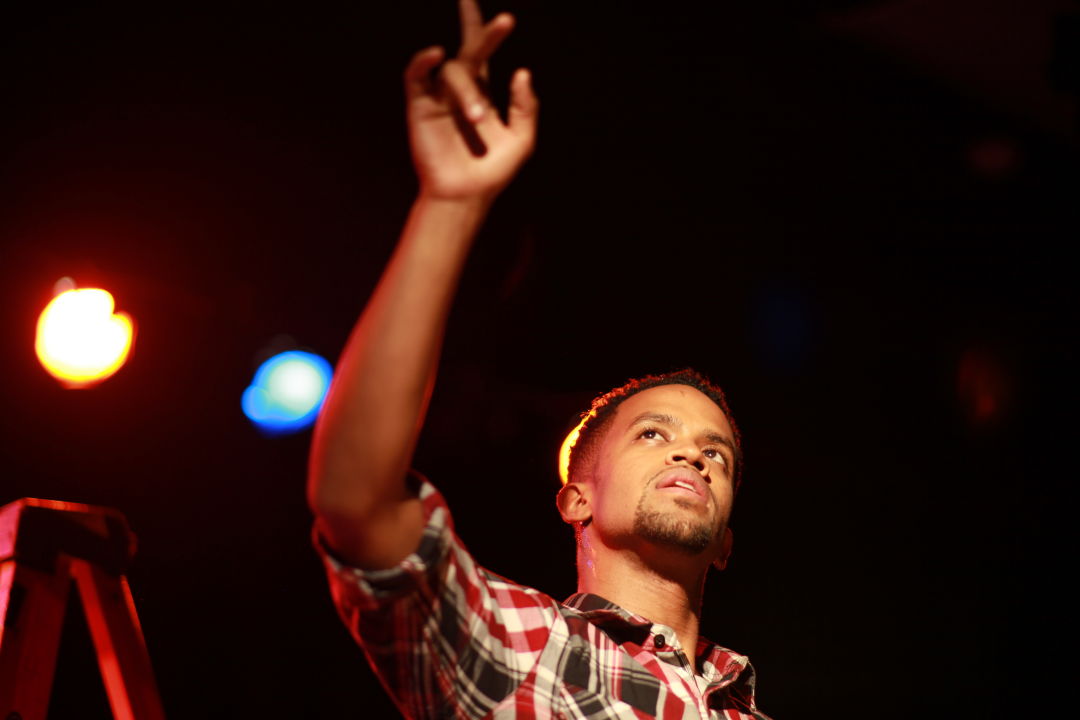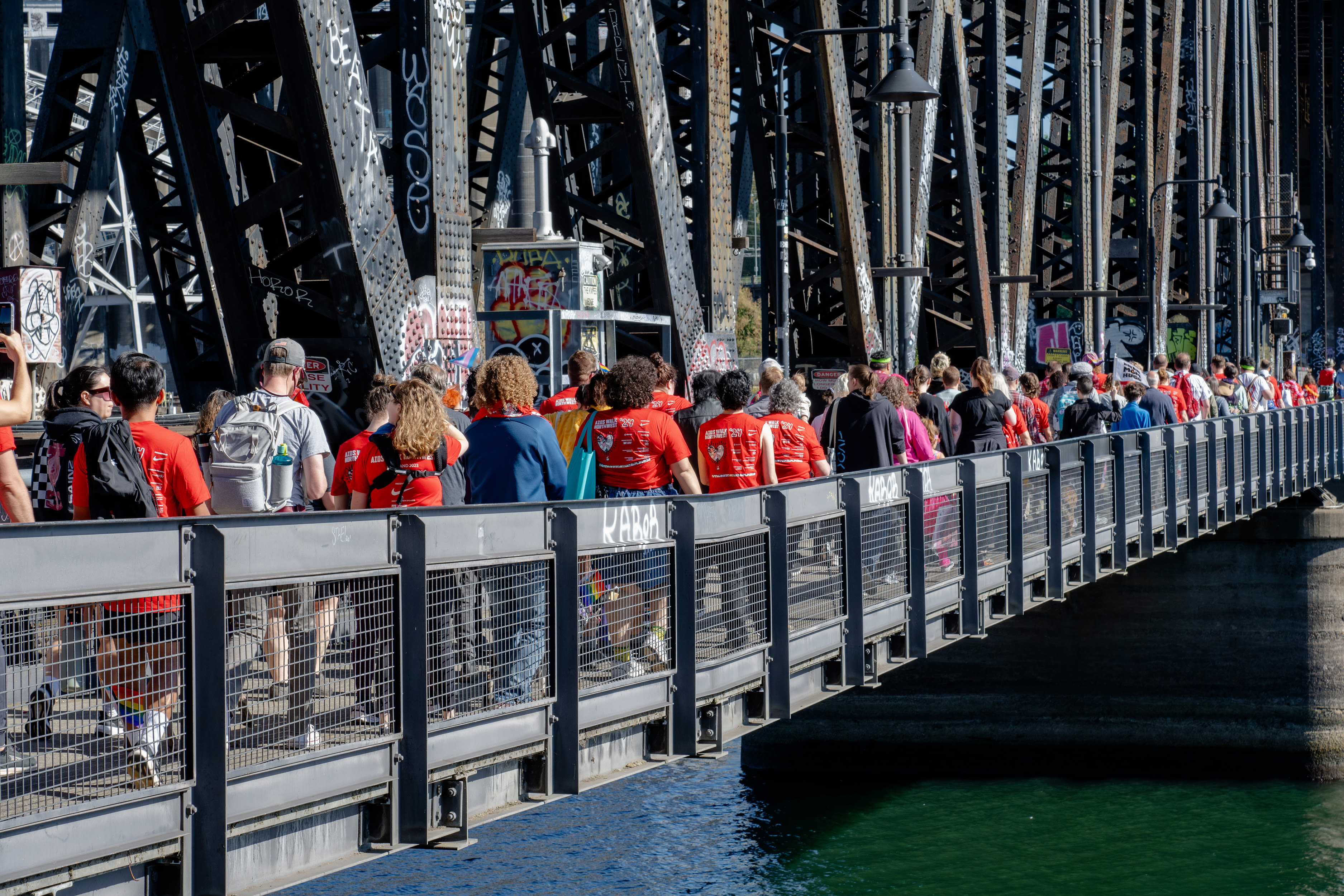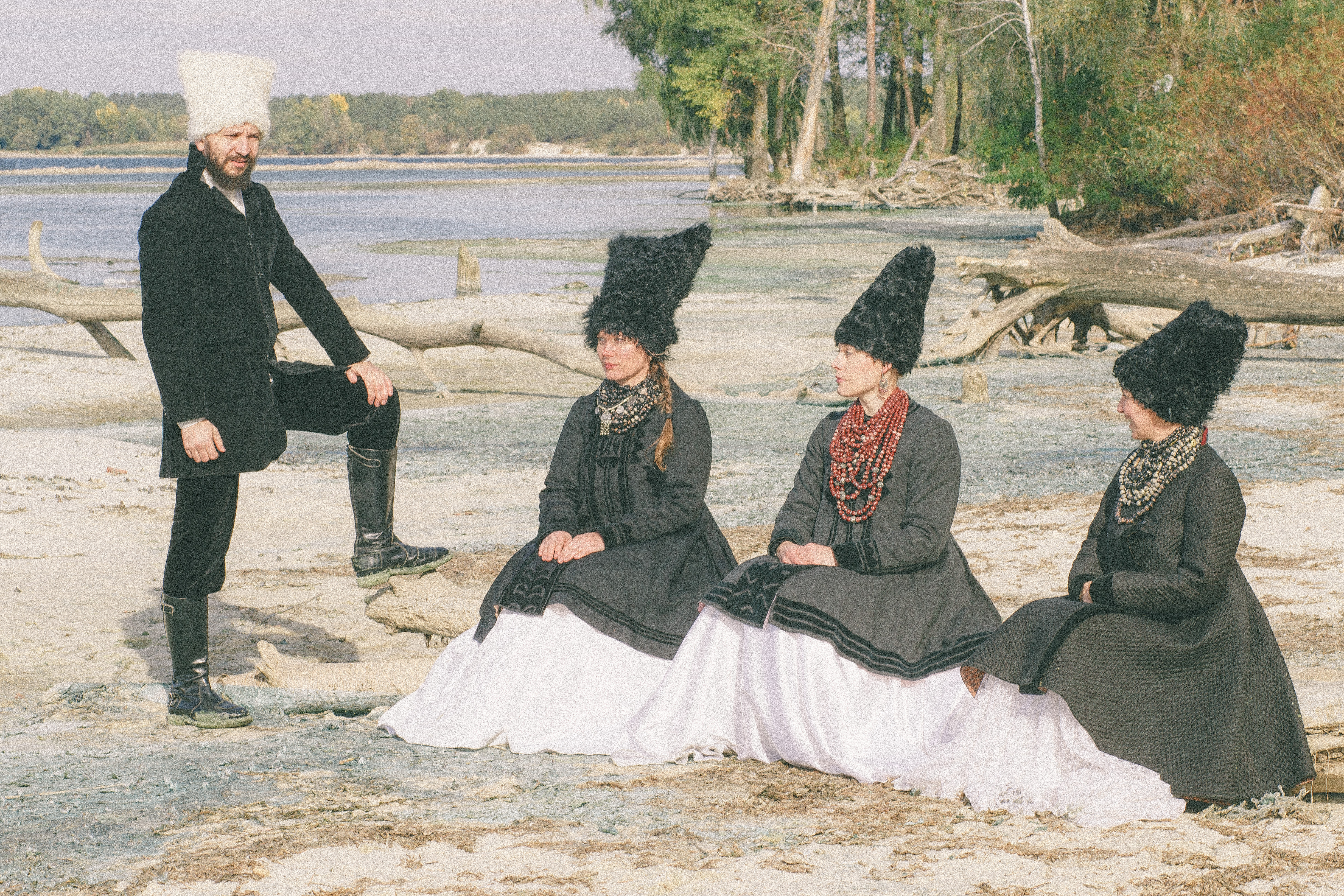Hip Hop Meets Theater in Spiritrials

Image: Courtesy Boom Arts
It’s hip hop. It’s theater. It’s a personal narrative with a political punch. Dahlak Brathwaite’s Spiritrials, brought to Portland by Boom Arts, is an exploration of America’s police and justice system through Brathwaite’s own experiences, and it's playing in Portland April 21–30. We caught up with Brathwaite and local hip-hop artist Mic Crenshaw to talk racial profiling, fighting stereotypes, and why Portland needs to see Spiritrials.
Tell us about the personal story that led to Spiritrials.
DB: About nine years ago, when I was a young lad, I got pulled over about three miles three or four miles from the college I just graduated from. I was stopped, I was searched, and by a fluke I had mushrooms on me that a friend gave to me. In the state at the time, any quantity was worthy of a felony, and in the county they were adding transportation charges to anybody caught moving with any type of controlled substance. I was forced into this drug rehabilitation program and forced to admit drug addiction and get treatment in order to possibly get my case dismissed.
Why did this incident end up becoming something you wanted to incorporate into your art?
DB: I had been performing in a similar capacity as I am right now for about 12 years, and I think the only thing that stopped me from exploring it immediately was because I just didn’t know how to. I was ashamed, I was embarrassed, I didn’t want to talk about it. It happened to me in 2008, and in 2009, Oscar Grant was shot in Oakland, California. There was a string of murders that happened in the next four or five years. I felt like I had to start telling these stories and telling my story even if it was tough and difficult for me. Even if I felt a sort of shame or embarrassment about it, I felt other people had to know about it. At the same time, Michelle Alexander’s book The New Jim Crow came out, and all of that formed a wave right at the time I was beginning to tell the story.
Why do you think Portlanders should see this show?
MC: I watched the show myself and I really loved the way that Dahlak was able to tie hip hop and theater and poetry and drama, all these different elements together to tell his story. It’s a story that starts with what could be construed as a set of stereotypes—a young black man getting arrested and there being drug possession and him having to go through some type of program that’s part of the system. Those stereotypes [are] things we commonly assume once we hear certain buzzwords, but when you get to watch the show, it’s a window into an individual that far exceeds any stereotypical misconception.
What did you set out to explore when putting this work together?
DB: What made this story complex and also makes it a good play is that it’s not so clear-cut. I had been profiled throughout my life, and so it all did seem like it was supposed to happen to me. Like, I tried to work to not succumb to the fate of so many young black males, but in the end I couldn’t outrun my fate, apparently. And then there was an element of guilt, where I had the substance on me, so what does that mean? How do I justify that? Where do I stand in relation to the law? Why were these laws in place in the first place? How does being profiled your whole life lead you to a certain destination? What role do you have in that? What agency do you have in that and what’s a bigger societal force? All these questions get asked during the play.
MC: There are a lot of issues he deconstructs around race and identity, black male identity specifically. In a city where black folk are so marginalized and such a small percentage of the population, it’s important to have spaces where we can look at identity. A young black man was just killed here a couple of months ago, so this is not new to us. There are still monthly memorials being held for Keaton Otis.
What are you hoping the audience will take away from your show?
DB: Questions. There's a lot there. I think Spiritrials tells a story of a young black male, of a person of color, that doesn’t get often told because stories that are told about people of color are usually so heightened—they have to be heightened in order to be worthy. It’s like, if you didn’t get killed or you didn’t go to jail, or you’re not dealing drugs, if you’re not at the brink of being killed, it’s not story-worthy. I think part of what kept me from writing this so long is that when I was telling so many of my friends and peers about what happened, it just felt commonplace, a rite of passage, something that happens to all of us. You’re just hearing a story of a young, black, middle-class kid raised by good parents, going to college, but who couldn’t escape fate. It really makes us all question what we’ve come to accept as normal, and if we want to continue to accept it as normal.
Do you think things are moving in the right direction?
MC: This whole question of whether or not black life is disproportionately under attack by police is something we historically have to grapple with, and we’re going to be grappling with it into the future. On a local level I don’t think there have been significant changes that make it safer for black people in relation to law enforcement, and I don’t think those changes have occurred on the national level. In my opinion, the root cause of those type of things happening have to do with the foundation of our society as a white supremacist, capitalist society and we can’t really change those things until we change property relations.
DB: It’s tough because there is a lot to worry about, and there is a lot of fear, but I think one of the most hopeful things that was happening before Trump was elected is that there seemed to be a genuine care and a genuine, sincere commitment to try to reform some of the historical injustices that have landed us in this place. But it’s no quick fix. It really takes a historical look. It takes a true search and inventory of how we have all been complicit in allowing this, and sometimes been proponents of certain structures and systems that continue to oppress and displace black people since our arrival into this country. But if we can get past all the current fears and other pressing agendas to say hey, we want to confront this from a historical standpoint, that this is something that came before all of us but now we’re all responsible for, that’s our only option.
Spiritrials
7:30 p.m. Fri–Sat and 2 p.m. Sun, Apr 21–23; Thu–Sun, Apr 27–30, Disjecta Contemporary Art Center, $12–20




